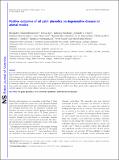| dc.contributor.author | Sambanthamurthi, Ravigadevi | |
| dc.contributor.author | Tan, YewAi | |
| dc.contributor.author | Sundram, Kalyana | |
| dc.contributor.author | Hayes, Kenneth C. | |
| dc.contributor.author | Abeywardena, Mahinda | |
| dc.contributor.author | Leow, Soon-Sen | |
| dc.contributor.author | Sekaran, Shamala Devi | |
| dc.contributor.author | Subramaniam, Krishnan | |
| dc.contributor.author | Fairus, Syed | |
| dc.contributor.author | Wahid, Mohd Basri | |
| dc.contributor.author | Sambandan, T G | |
| dc.contributor.author | Rha, Chokyun | |
| dc.contributor.author | Sinskey, Anthony J | |
| dc.date.accessioned | 2012-11-13T16:07:52Z | |
| dc.date.available | 2012-11-13T16:07:52Z | |
| dc.date.issued | 2011-06 | |
| dc.date.submitted | 2011-03 | |
| dc.identifier.issn | 0007-1145 | |
| dc.identifier.issn | 1475-2662 | |
| dc.identifier.uri | http://hdl.handle.net/1721.1/74627 | |
| dc.description.abstract | It is well established that plant phenolics elicit various biological activities, with positive effects on health. Palm oil production results in large volumes of aqueous by-products containing phenolics. In the present study, we describe the effects of oil palm phenolics (OPP) on several degenerative conditions using various animal models. OPP reduced blood pressure in a NO-deficient rat model, protected against ischaemia-induced cardiac arrhythmia in rats and reduced plaque formation in rabbits fed an atherogenic diet. In Nile rats, a spontaneous model of the metabolic syndrome and type 2 diabetes, OPP protected against multiple aspects of the syndrome and diabetes progression. In tumour-inoculated mice, OPP protected against cancer progression. Microarray studies on the tumours showed differential transcriptome profiles that suggest anti-tumour molecular mechanisms involved in OPP action. Thus, initial studies suggest that OPP may have potential against several chronic disease outcomes in mammals. | en_US |
| dc.language.iso | en_US | |
| dc.publisher | Cambridge University Press | en_US |
| dc.relation.isversionof | http://dx.doi.org/10.1017/S0007114511002133 | en_US |
| dc.rights | Article is made available in accordance with the publisher's policy and may be subject to US copyright law. Please refer to the publisher's site for terms of use. | en_US |
| dc.source | MIT web domain | en_US |
| dc.title | Positive outcomes of oil palm phenolics on degenerative diseases in animal models | en_US |
| dc.type | Article | en_US |
| dc.identifier.citation | Sambanthamurthi, Ravigadevi et al. “Positive Outcomes of Oil Palm Phenolics on Degenerative Diseases in Animal Models.” British Journal of Nutrition 106.11 (2011): 1664–1675. © Cambridge University Press 2011 | en_US |
| dc.contributor.department | Massachusetts Institute of Technology. Biomaterials Science and Engineering Laboratory | en_US |
| dc.contributor.department | Massachusetts Institute of Technology. Department of Biology | en_US |
| dc.contributor.mitauthor | Sambandan, T. G. | |
| dc.contributor.mitauthor | Rha, ChoKyun | |
| dc.contributor.mitauthor | Sinskey, Anthony J. | |
| dc.relation.journal | British Journal of Nutrition | en_US |
| dc.eprint.version | Final published version | en_US |
| dc.type.uri | http://purl.org/eprint/type/JournalArticle | en_US |
| eprint.status | http://purl.org/eprint/status/PeerReviewed | en_US |
| dspace.orderedauthors | Sambanthamurthi, Ravigadevi; Tan, YewAi; Sundram, Kalyana; Hayes, Kenneth C.; Abeywardena, Mahinda; Leow, Soon-Sen; Devi Sekaran, Shamala; Sambandan, T. G.; Rha, ChoKyun; Sinskey, Anthony J.; Subramaniam, Krishnan; Fairus, Syed; Basri Wahid, Mohd | en |
| dc.identifier.orcid | https://orcid.org/0000-0002-1015-1270 | |
| dc.identifier.orcid | https://orcid.org/0000-0002-6671-5987 | |
| mit.license | PUBLISHER_POLICY | en_US |
| mit.metadata.status | Complete | |
